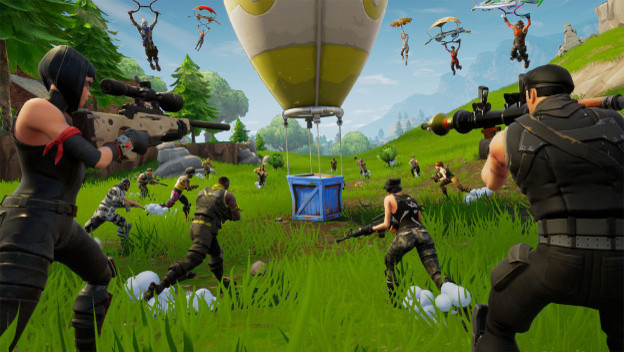There’s a huge battle going on in gaming right now. It’s not Nintendo vs. Sega, or Sony vs. Microsoft, PC vs. consoles, or even loot boxes vs. European legislative bodies. No, the biggest battle in gaming right now is the battle for time. It sounds obvious, but there’s only so much free time a person, a consumer, has. And more and more entertainment options are demanding more and more of that time. As such, entertainment companies, regardless of their content space, are bleeding through their respective boundaries and beginning to see each other as competition. No better example of this is a battleground forming between two absolute titans in entertainment media: Netflix and Fortnite .
Where the heck does this framing even come from? Well, directly from Netflix. In a presentation letter to shareholders outlining where Netflix is, plans to be, and everything in-between, Fortnite gets a little shout out. See, way back when Netflix was becoming, you know, Netflix , the target was HBO. HBO was king of prestige TV, and Netflix wanted a piece. It has that piece now, and has arguably conquered TV mindshare. Or at least it shares the throne room. Now, here’s where the bleeding starts.
Netflix is on-demand entertainment now. Sure, you can still have discs sent to you, but most people use the streaming feature instead if they don’t use both. The way things are now with entertainment, convenience trumps all. Digital services are all competing for the modern consumer’s inclination to “binge,” or consume content almost passively. Going to a movie, or sitting down with a deliberately rented DVD or reading a book are much more premeditated activities. Meanwhile, Netflix benefits just as much from being background noise or entertainment that comes at weird times when folks are just relaxing at home. Enter video games.
Video games now are firmly planted in that service model now. Games want you to spend your lazy, relaxing time on them now as well. Look at stuff like Destiny or The Division . These aren’t games you play when you want to be engaged with an interesting story or hardcore mechanics. You play them to zone out and pass the time when you want to escape from the challenges of real life. Fortnite takes that to a whole other level. People just hang out in Fortnite . They use Fortnite and squad up with their friends like hanging out in a proverbial parents’ basement, albeit a detached, virtual one. Kids, teenagers, adults, and streamers alike hang out in Fortnite .

This is why the competition is so fierce. Netflix is at the top of the mountain in TV entertainment. Fortnite is at the top of the mountain in service gaming. But what about the mountain of everything, of all entertainment? There are further peaks to be scaled. And to quote the letter from Netflix to its shareholders, “We earn consumer screen time, both mobile and television, away from a very broad set of competitors. We compete with (and lose to) Fortnite more than HBO… There are thousands of competitors in this highly-fragmented market vying to entertain consumers.” Hey look, it’s everything I just said boiled down to two sentences.
More than ever before, entertainment is entertainment. Everything you do In your increasingly limited free time, when your brain is bulging from overwork and burnout, everything out there is competing for that precious space. And that’s why individual industries aren’t a broad set of disparate competitions anymore. Video games don’t just compete with other video games. Streaming services are just as much of a threat as another game in the same genre space. Sure, this has always been technically true, but now we’re seeing it acknowledged in conversations between business and shareholders. That could have a major impact on the future of content curation and consumption.
